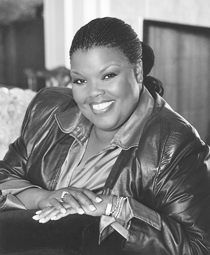Vying to fill opera’s Verdian void
On March 8, one of the newer Verdian contenders on the scene, soprano Angela Brown, gave an exciting Verdi/Gershwin concert with the Hunter Symphony in the College’s auditorium. Conductor Nicholas G. M. Ross did best with the disjunctions of Gershwin’s “American in Paris;” overall the high quality of the orchestral playing came as a pleasant surprise. Brown, nurtured at Opera Company of Philadelphia, where she has sung six leading roles and is readying Bess for next season’s opposite Gregg Baker’s first Porgy, became a New York Times-recognized star last year with her impressive, largely unheralded debut Aida.
Before performing Aida’s two set-pieces with luminous sound and increased attention to verbal values—if not quite fully idiomatic Italian declamation—Brown opened with the tricky “Pace, pace” from “Forza.” She’s not yet perfect when it came to some details—transitions from her impressive chest register to the full, radiant top and—even more so—shifts among dynamic levels can be less than smooth; but what a beautiful, rich sound, and what a gracious, compelling presence! The two most famous numbers from “Porgy”—“Summertime” and “My man’s gone now,” neither of them sung by Bess—followed, showing highly impressive vocalism and style, though the words might have been clearer.
As an encore, she offered as beautifully sung, phrased and articulated a performance of “He’s got the whole world in his hands” as I have ever heard or expect to hear—every word was absolutely crisp here. I saw through my own tears that tears flowed all around.
One of these mornings, Angela Brown is going to wake up singing all of Leonora di Vargas, the testing heroine of “Forza,” and we’ll all be better off. With trepidation I approached the Met on the Ides of March for a performance of opera’s bad luck piece featuring the cover cast. Having read dire things about Elena Zelenskaya’s company debut in “Un ballo in maschera” in 2001, I feared—and, yeah, on one level maybe hoped—that the Baku-born soprano would give the audience a genuine disaster to savor. In the event she emerged, if unenlightening, at least of high competence, which is saying something in the current Verdian drought. Her essentially large lyric voice possesses a very dark coloration, which may be why her bio includes such scarifying roles as Lady Macbeth and Odabella.
Zelenskaya’s lower voice is in good order, and the columnar middle is often handsomely produced, sometimes even allowing dynamic shading; her sung Italian is clearer than the prevailing opaque Russian standard. But at the top, she lacks the kind of expansiveness Leonora’s music demands, and the challengingly placed B flats and Bs tripped her up—the inexorable price of singing repertory beyond her means. Still, this was an honest, solidly professional performance.
A spirited and handsome presence onstage, mezzo Mary Philips made a promising company debut as the war-mongering camp follower Preziosilla; she sang her difficult music quite well, in a full, attractive voice somewhat recalling the late, lamented Tatiana Troyanos. I have enjoyed baritone Mark Rucker’s well-sung Verdi performances for years at regional companies and was glad to see him awarded a second Met role after his much belated debut last season in “Aida;” Rucker sang with style, though the voice sounded a bit worn and proved a mismatch in scale with the unartful, legato-free yelling of the gifted—and clearly destined not to develop his gifts—Salvatore Licitra. The visceral, rolling bass of Vitalij Kowaljow as Guardiano furnished the evening’s primary vocal pleasure and “Metropolitan quality;” it’s time for the young Ukrainian to develop more stage personality, but the voice is tops. Gianandrea Noseda’s frenetic conducting did not help anyone.
The company’s Maurizio Benini-led ongoing revival of its dramatically patchy 2001 “Luisa Miller,” with its bizarrely Dickensian Act I cityscape and its drop curtain suggesting the Paris of “Il tabarro”—what an odd evocation of German rural life!—was well worth hearing on March 17 in a performance involving unscheduled appearances by covers. The forthright, solid tenor Edoardo Villa replaced the temperamental Neil Shicoff; Villa himself sounded rather ill but rallied for a strong performance of Rodolfo’s great scena. Villa needs to work with real directors to acquire some—any—stagecraft. The good news was recent Curtis grad Karen Slack’s highly promising emergency debut as Luisa: a beautiful lyric voice with admirable spin and float for days, if not much expansiveness. She had the grace and smarts not to force through this incredibly difficult assignment and portrayed the simple, likable Luisa simply and likeably. Brava! One hopes she will resist efforts to push her into Aida and the Leonoras; this is a remarkable, unspoiled voice for Mozart’s Countess and Ilia, in Verdian terms for Alice Ford.
Slack will also be in Philadelphia’s “Porgy,” singing “Summertime” as Clara. Book early!
Carlos Alvarez and James Morris overcame initial gruffness to turn in some worthy singing, but overall this was Ladies’ Night. Irina Mishura, in highly impressive voice, contributed surely the best Federica since Bianca Berini’s in 1982; and young Tamara Mumford displayed a memorably lovely mezzo that will doubtless soon tackle bigger assignments than Laura, Luisa’s confidante.
David Shengold (shengold@yahoo.com) writes about opera for many venues.
gaycitynews.com



































